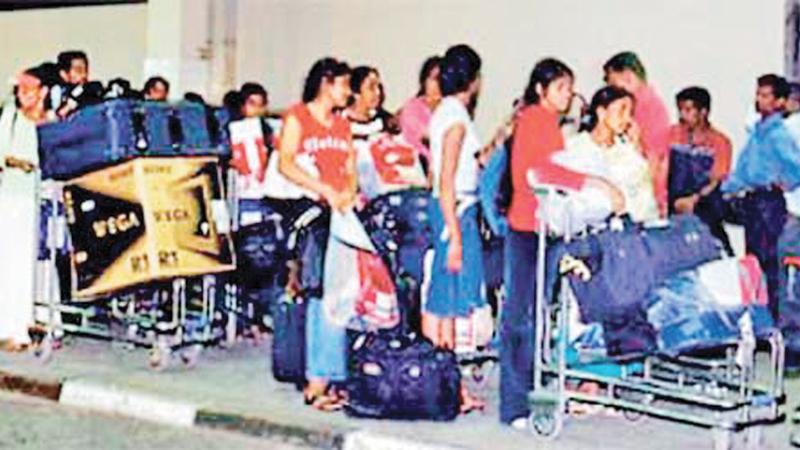

Migrant workers are not export commodities but rather human resources which need to be recognised and respected for their contribution to the country, said panellists during a ‘labour migration’ forum in Colombo last week.
Sri Lanka sends around 200,000 to 220,000 workers abroad each year and today, around 1.8 million Sri Lankan expatriate workers contribute around US$ 8 billion in foreign remittances a year which is about 8-10 percent of the GDP, the panellists said.
“No government has the right to restrict mobility of the people. Everyone has the freedom to remain in the country or go overseas for employment. People look out for opportunities overseas to educate their children, build a house or give their children in marriage,” said Community Development Services (CDS) Executive Director Andrew Samuel.
He said that the move to migrate for work should be a well informed decision which will help the migrant to avoid pitfalls to a great extent.
The forum themed ‘Media-Sensitising on Labour Migration for sustainable political, economic and social development’ was organised by the Swiss Agency for Development Cooperation, Helvetas Swiss Intercooperation, CDS and the Free Media Movement, Sri Lanka.
“It is the right of every citizen to seek a better living, and it is the duty of the government to recognise the contribution of migrants and engage them productively for the betterment of the country,” said Senior National Program Officer Embassy of Switzerland in Sri Lanka and the Maldives, Madushika Lansakara, adding that there is so much that the country could capitalise on from labour migration without focusing only on the money they bring to the country. Studies on labour migration show that migration for work has the potential to provide vital income that supports education and household costs, while benefiting women who gain social, economic and vocational skills through overseas employment.
However, according to research, emigrating in large numbers from Sri Lanka has not translated into opportunities for decent work, social protection or freedom from discrimination. On the contrary, every stage of the migration cycle is beset with challenges and risks.
“There are lots of bumps on the road to migration for work that someone has to be held responsible for. Journalists must advocates or activists be able to challenge wrong policies of the government,” Samuel said, adding that scribes need to inculcate development journalism. Studies also reveal that a majority of Sri Lankans who go overseas for employment are either semi or low- skilled workers of which about 50,000-60,000 are domestic workers who are subjected to harsh working conditions. Statistics reveal that women migrant domestic workers constitute the bulk of women workers emigrating from Sri Lanka. Between 2012 and 2018 of 1.8 million migrant workers, around 40.2 percent were women and of these, 74.9 percent were registered as domestic workers. Studies further show that 59.0 percent of female workers migrate before the age of 35 and their migration is chiefly motivated by financial needs.
Risk for women migrant workers begins at pre-departure stage during which unscrupulous recruitment agents or agencies provide misinformation while charging exorbitant fees. Female migrant workers get into trouble once they arrive at the country for work and find contract conditions being changed or replaced.
Restrictions to movement, limitations to collective bargaining, squalid working conditions , inadequate food intake, substandard accommodation and healthcare and deprivation of privacy are some of the harsh working condition reported by migrant workers. From 2013 to 2016, over 26,000 grievances were reported to the Foreign Employment Bureau on violation of labour rights.
“Pre-migration factors in Sri Lanka is not looked into adequately. The situation of children, spouses role, training and remittances play a major role at this stage while respecting the laws of the country in which one works during on-site, return and reintegration and remigration are key stages of labour migration,” the panellists said.
Labour migration should focus on political, economic and social equity which includes policy, rights of migrants, conventions, remittances, skills development, brain gain, families, working conditions, occupational health issues, abuses, gender and social equity. “Ninety percent on labour migration by local media is negative reporting.
There has to be the positive and negative in reporting to enable readers to see both sides of the industry,” a spokesman for the Free Media Movement said.
